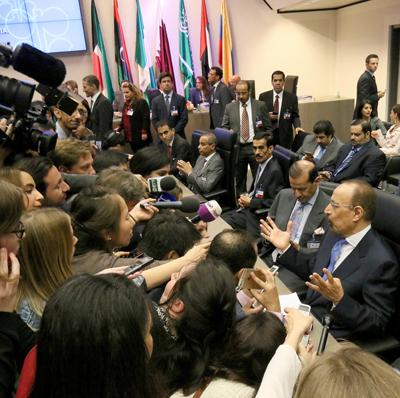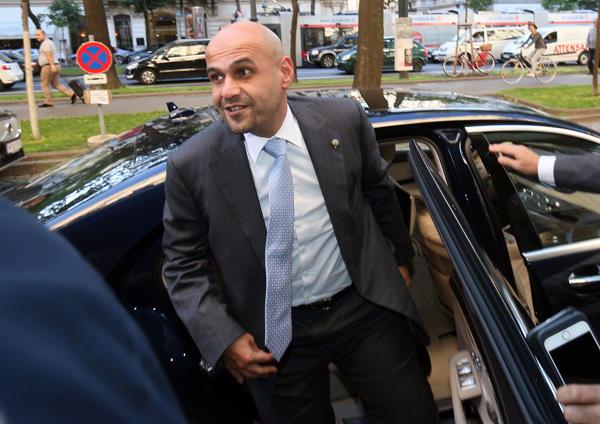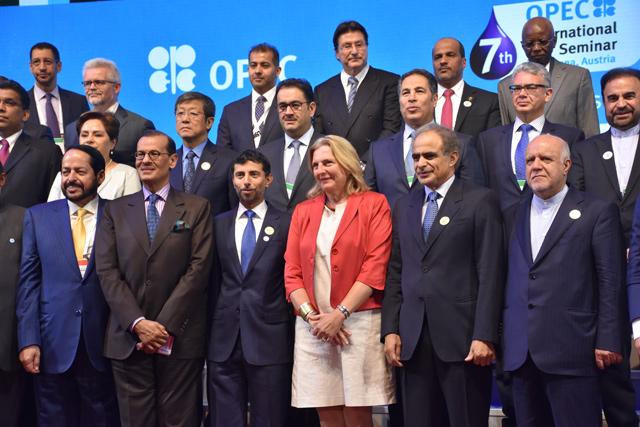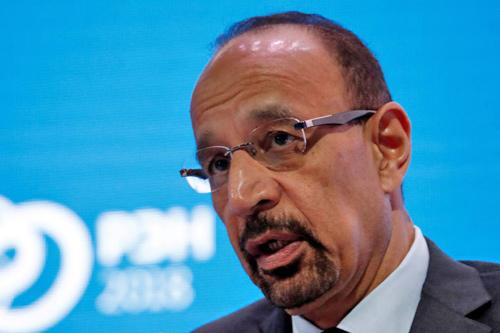You are here
OPEC fails to agree policy but Saudis pledge no shocks
By Reuters - Jun 02,2016 - Last updated at Jun 02,2016

Khalid Al Falih, minister of energy, industry and mineral resources of Saudi Arabia, speaks to journalists prior to the start of a meeting of the Organisation of the Petroleum Exporting Countries at their headquarters in Vienna, Austria, on Thursday (AP photo)
VIENNA – Saudi Arabia promised on Thursday not to flood the oil market with extra barrels even as OPEC failed to agree on output policy, with Iran insisting on the right to raise production steeply.
Tensions between the Sunni-led kingdom and the Shiite Islamic republic have been the highlights of several previous OPEC meetings, including in December 2015 when the group failed to agree on a formal output target for the first time in years.
Tensions, however, were less acute on Thursday as Saudi Arabia's new energy minister, Khalid Al Falih, showed Riyadh wanted to be more conciliatory and his Iranian peer Bijan Zanganeh kept his criticism of Riyadh to an unusual minimum.
In a rare compromise, OPEC also decided unanimously to appoint Nigeria's Mohammed Barkindo as its new secretary general after years of friction over the issue.
Saudi Arabia and its Gulf allies had tried to propose OPEC set a new collective ceiling in an attempt to repair the group's waning importance. But Thursday's meeting ended with no new policy or ceiling amid resistance from Iran.
Despite the setback, Saudi Arabia moved to soothe market fears that failure to reach any deal would prompt OPEC's largest producer, already pumping near record highs, to raise production further to punish rivals and gain additional market share.
"We will be very gentle in our approach and make sure we don't shock the market in any way," Falih told reporters.
"There is no reason to expect that Saudi Arabia is going to go on a flooding campaign," Falih said when asked whether Saudi Arabia could accelerate production.
The market has grown increasingly used to OPEC clashes over the past two years as political foes Riyadh and Tehran fight proxy wars in Syria and Yemen.
Saudi Arabia effectively scuppered plans for a global production freeze — aimed at stabilising oil markets — in April in the Qatari capital of Doha. It said then that it would join the deal, which would also have involved non-OPEC Russia, only if Iran agreed to freeze output.
Tehran argues it should be allowed to raise production to levels seen before the imposition of now-ended Western sanctions over Iran's nuclear programme.
Zanganeh said Tehran would not support any new collective output ceiling and wanted the debate to focus on individual country production quotas, effectively abandoned by OPEC years ago.
"Without country quotas, OPEC cannot control anything," Zanganeh told reporters. He insisted Tehran deserved a quota — based on historic output levels — of 14.5 per cent of OPEC's overall production.
OPEC is pumping 32.5 million barrels per day (bpd), which would give Iran a quota of 4.7 million bpd — well above its current output of 3.8 million, according to Tehran's estimates, and 3.5 million, based on market estimates.
At its previous meeting in December 2015, OPEC effectively allowed its 13 members to pump at will.
As a result, prices crashed to $27 per barrel in January, their lowest in over a decade, but have since recovered to around $50 due to global supply outages. On Thursday, Brent prices eased 1.5 per cent to $49 per barrel.
That OPEC could not agree on a benign deal is a sign that political differences are undermining the organisation, said Gary Ross, founder of US-based PIRA consultancy.
"It is bearish short-term for oil prices. But what is also important is that Saudis are not planning to flood the market," Ross added.
Zanganeh made a few conciliatory remarks, saying he was happy with the meeting and received no signals from other producers that they planned to increase output.
For Amrita Sen of Energy Aspects, who like Ross travelled to Vienna to meet OPEC officials, the meeting sent an encouraging signal about the state of the organisation.
"After the Doha debacle, it actually restores market confidence that Saudi Arabia is committed to OPEC. This is a success compared to three days ago when people had been expecting Falih to walk out of the OPEC room," said Sen.
Falih was the first OPEC minister to arrive in Vienna this week, signalling he takes the organisation seriously despite fears among fellow members that Riyadh is no longer keen to have OPEC set output.
"There could be shorter-term situations in which, in our view, OPEC might intervene and yet other situations — such as long-term growth of marginal barrels — in which case it should not," Falih told Argus Media ahead of the meeting.
Related Articles
VIENNA – Gulf OPEC members including Saudi Arabia are looking to revive the idea of coordinated oil-output action by major producers when th
VIENNA — The Organisation of the Petroleum Exporting Countries (OPEC) cartel meets on Friday to decide output policy amid calls from major c
VIENNA — Saudi Energy Minister Khalid Al Falih met US special representative for Iran Brian Hook in Vienna on Wednesday, sources f



















